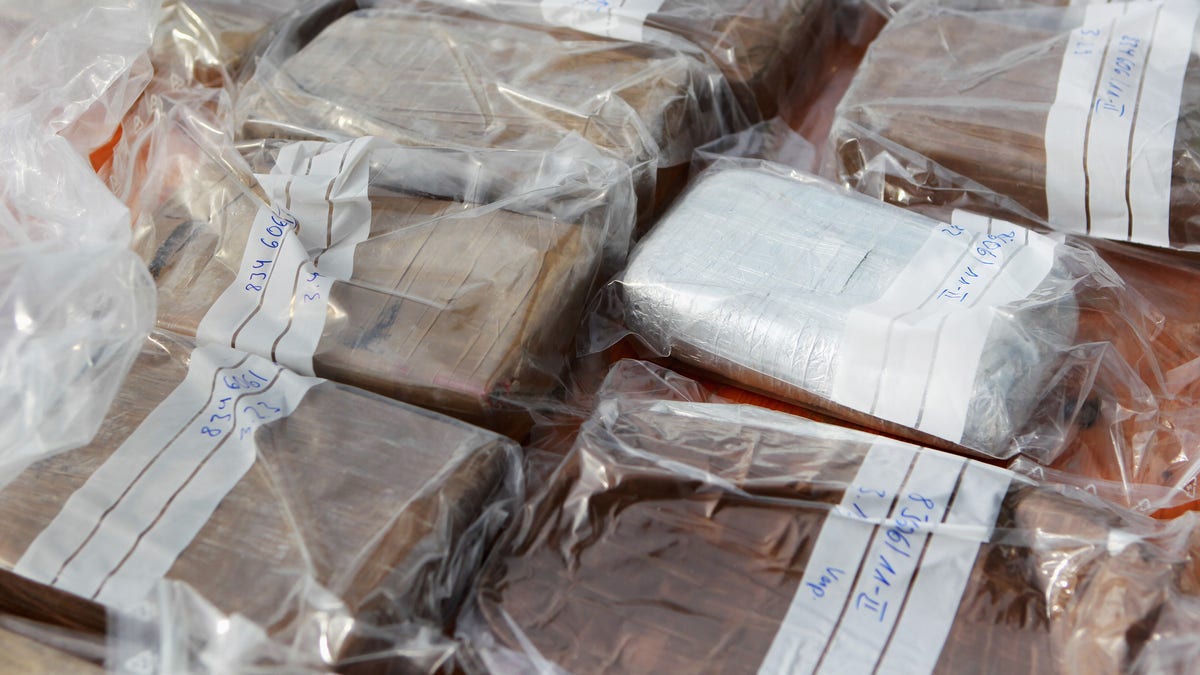
HAMBURG, GERMANY - MARCH 07: Packages containing confiscated cocaine are seen at a press conference on March 4, 2012 in Hamburg, Germany. Agents seized 260 kg of cocaine aboard the 'Tasman Mermaid', a ship that originated from Ecuador, after searching the vessel upon its arrival in Hamburg port in November, 2011. (Photo by Joern Pollex/Getty Images) (2012 Getty Images)
Used by the British Empire as a penal colony, Australia has always been a place that has lured outlaws and roughnecks. Now, as a sign of their growth and power, the country has attracted a new type of desperado to its shores.
Mexico’s notorious drug cartels are taking advantage of Australia’s growing taste for cocaine and shipping large amounts of the powdery substance to Melbourne via the United States. The cartels are using Australia’s outlaw motorcycle clubs (OMC) and other criminal groups to distribute the drugs to customers in the country.
Police in the southeastern Australian city arrested two men with alleged ties to an international drug trafficking ring that works with Mexican cartels. One of the men arrested is purported to be a high ranking member of the Comanchero Motorcycle Club.
"This result sends a clear message to crime syndicates," said Victoria Police Assistant Commissioner of Crime Stephen Fontana, according to Australia’s Herald Sun newspaper. "This result sends a clear message to crime syndicates."
The arrest of the two alleged traffickers is part of a 16-month operation, spearheaded by the Joint Organized Crime Task Force (JOCTF) that is comprised of the Australian Federal Police (AFP), Victoria Police, Australian Customs and Border Protection Service and the Australian Crime Commission (ACC). The groups also saw the seizure last month of 2.4 kilograms of a methylamphetamine-type substance and a seizure in September last year of more than 2 kilograms of cocaine.
They've recognized a place like Australia, where the price of cocaine can yield them a much greater profit margin compared to selling a kilogram here in the United States.
U.S. Drug Enforcement Administration (DEA) officials also confirmed to Fox News Latino that they were involved in the operation.
While it is unclear which cartel the outlaw motorcycle club members were working with, it is well known that Joaquín “El Chapo” Guzmán’s Sinaloa cartel has a major stake in Australia’s burgeoning cocaine market. Sinaloa cartel is considered to be the most powerful drug trafficking organization in Mexico - as well as the rest of the world - and supposedly has links to drug networks across the globe.
"They've recognized a place like Australia, where the price of cocaine can yield them a much greater profit margin compared to selling a kilogram here in the United States,” said Rodney Benson, chief of intelligence at the DEA, according to NPR.
In Brownsville, Texas, a kilogram of cocaine retails for $16,000, while in Sydney a kilo can fetch around $250,000.
The Mexico-Melbourne connection is one indication of the expanding global presence of Mexico’s cartels.
"The Mexican cartels have gone global," Shannon O’Neil, a Douglas Dillon Fellow for Latin America Studies at the Council of Foreign Relations, told Fox News Latino earlier this summer. "The question is who will take over in Europe, in Russia."
The DEA recently announced documented links between Mexican cartels and criminal groups in Mozambique, the Democratic Republic of the Congo, Ghana and Nigeria. The Sinaloa cartel is also known to have ties not only in Europe but throughout Latin America, Africa, Asia and Australia, where a booming trade has developed in the country’s cities. Sinaloa’s main rival, The Zetas, have made inroads with organized crime groups in Italy.
A 10-year investigation by Italian authorities earlier this year revealed ties between Italian groups and Mexican drug traffickers to move shipments of cocaine across the Atlantic Ocean.
The Italian-Mexican connection was allegedly spearheaded by Elio and Bruno Gerardi, two Italian brothers based out of Monterrey who shipped hundreds of tons of cocaine on behalf of La Cosa Nostra inside of industrial ovens. While the two brothers remain at large, a number of key figures linked to the Italian organized crime group are in custody.
"The U.S. is not the only game in town," said Rusty Payne, a DEA spokesman, adding that tougher tactics from both the Mexican and U.S. governments have led Mexican cartels to look elsewhere.
Earlier this year, Australia’s Federal Police Commissioner Tony Negus said that the country’s strong economy and the high dollar has made the country a prime location for drug traffickers.
“Also, Australia seems to have a thirst for the types of drugs that are being pushed through the border and that is things like heroin, cocaine,” he added, in the daily newspaper the Australian.
The Mexican cartels not only have ties to OMC’s in Australia but also rely on local drug syndicates and Asian crime organizations working in the country. Two people in 2011 were sentenced to lengthy jails sentences for attempting to buy the drugs for a Sydney-based Asian criminal syndicate, after a Mexican man set up a front company in which drugs were trafficked through.
The flow of drugs from Latin America into Australia does not seem like it will slow down anytime soon, thanks to the high profits cartels make in the country and Australians taste for cocaine, which they view as a chic, popular drug. The prevalence of cocaine use in Australia grew from 1.4-1.7 percent in 2009 to 1.5-1.9 in 2010, according to the United Nations Office on Drugs and Crime 2012 World Drug Report.
"Cocaine is a little bit more fabulous, sorry. You've got money in Sydney, because it's so expensive that only the rich models and designers and musicians and all the cool kids do it," Blade, a fictitious name for a young cocaine user, told NPR. "So you look cool if you do it, pretty much."
